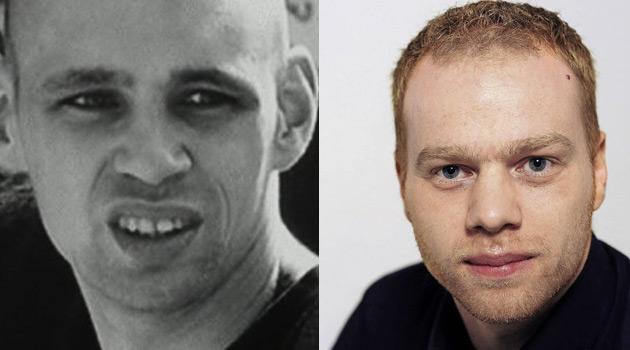Germany: Neo-Nazi murderer turned his life around to become a clergyman

The preacher Johannes Kneifel knows what the saying "People can change" means. The strapping 33-year-old with reddish-blond hair has a rebirth of his own behind him.
Kneifel used to be a neo-Nazi and even beat someone to death 16 years ago. He was subsequently imprisoned for that crime.
Now he visits schools to discuss preventing extremism and has described his experiences in a book. He urges people not to write off young right-wing extremists and to keep the path back to society open for them.
Kneifel believes people can never be certain they might not start down the extremist path themselves. "It always depends on their disposition, who they have around them, what situation they are in," he explains.
The former neo-Nazi says he never felt very good with his own parents. His mother had multiple sclerosis and his father was almost completely blind.
When his parents lost their jobs, there was not enough money for Johannes and his two siblings. He was ashamed of his parents’ powerlessness and angered by it.
Kneifel became someone who was constantly humiliating and insulting others and shouting. It was not until much later that he realized his parents had done their best to stand by him, even coming to his court appearances.
"That was not something commonplace, they were suffering," he admits. The family ultimately fell apart.
Kneifel was ordered by the court to spend a brief period in a psychiatric treatment facility for youth where, at the age of 13, he first encountered right-wing radicals – one year later, he had become one. "They give you the feeling that you are welcome, I felt like I had a new home," he recalls.
He began to drink a lot and get into fights. "Violence, in those circles, is the normal way to change something. Back then I believed that nothing could ever change without violence," he says.
It did not, therefore, seem strange to him when in August 1999, at the age of 17, for and a friend to beat to death a 44-year-old opponent of the neo-Nazis. He kicked the man as he was lying on the ground.
"He corresponded to our image of the enemy," Kneifel explains. The man died as a consequence of his injuries and Kneifel was sentenced to five years in juvenile prison for grievous bodily harm resulting in death.
"Everything might have been different back then if someone – a teacher, maybe – would have turned up who would have been able to inspire me to work for democracy, for the values of the republic," the young man reflects. Nobody like that was around, however.
Now when Kneifel speaks to schoolchildren he does his best to give them the courage to take advantage of the options a democracy affords them and to get involved. His rebirth began in a correction facility in Hameln in the state of Lower Saxony.
There he learned to be a machinist, went to mass, and met immigrants and Muslims, i.e., those who had previously been his "enemies" – and to his surprise, he got along well with them. "They were the first to give me a second chance," he says.
He became intensively involved in religion, spoke with the prison’s clergy, and experienced new emotions. After his release he established contact with a religious community, completed his high school education and then graduated from the seminary of the Liberal Protestant Church in Elstal near Berlin.
Currently he lives in the Saxon town of Zwickau in the east of the country, which is where his ex-wife comes from. He is a freelance preacher now, but the congregation in nearby Wilkau-Hasslau would like to hire him as their permanent parson.
"He told us about his past, the members of the congregation know it all," a representative of the leadership of the local church society says. "He has become a different person."
East of Germany disproportionately responsible for racist violence
Almost half of all the racially motivated attacks in Germany last year took place in Berlin and the new states of the federation in the east which, prior to 1990, belonged to the German Democratic Republic (GDR). The German Interior Ministry has provided that information in response to a query from Green Party MPs in the Federal Assembly.
Not quite one-fifth of Germany’s population lives in that area today. The metropolis of Berlin and the five eastern states are home to 17 % of Germany’s population, but in 2014, 47 % of all attacks committed by extremists with a racist or xenophobic subtext were perpetrated there.
Last year the Interior Ministry recorded that of 130 such assaults in the country as a whole, 61 occurred in the east, reportedly a 40 % rise compared to 2013.The more general category of felonies with an ultra-right background do not target only foreign nationals or immigrants, and last year authorities recorded a total of 1 029 such crimes.
The most such crimes were committed in the most populous state, North Rhein-Westphalia (370) and in the metropolis of Berlin (111) with the much less populated eastern states of Saxony (86) and Brandenburg (73) coming in third and fourth place. According to statistics, German Police managed to solve approximately 45 % of felonies linked to the ultra-right scene last year.
Irene Mihalic, an MP for the Green Party and a member of the Internal Affairs Committee in Germany’s Federal Assembly, claims that NGOs have reported much higher numbers through their own statistics than federal or state law enforcement. The NGOs report that 781 right-wing extremist-related felonies were committed in the eastern part of the country last year, while official statistics say only 410 such crimes occurred.